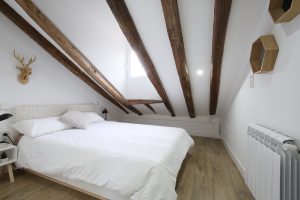How to measure and compare Madrid apartment sizes
You see an ad for an amazing apartment. You invest time and effort to see the property but leave disappointed: it was materially smaller than you imagined. Shopping for an apartment is so much clearer and easier in your home country. Moving 2 Madrid is here to help you. Here we explain the two metrics used to measure Madrid apartment sizes, the differences between these metrics and ways to avoid the common pitfalls often made by foreign investors. Do you want to discover the gold standard for interpreting Madrid apartment sizes? Keep reading.
What are metros construidos (total square meters)?
In English, metros construidos means total square meters. Total square meters refers to:
- All the space within the perimeter of the property
- Plus your share of the total square meters of the common areas.
Here’s an example:
The total area of the common areas in the apartment building is equal to 100 square meters. There are 10 apartments in the building, all the same size. Thus your share of the common areas for this property will be of 10 square meters (the total area of 100 square meters divided by 10 apartments).
If the apartment itself is 80 square meters, then the total square meters will be 90 square meters:
- 80 square meters- the space within the perimeter of the apartment
- Plus your 10 square meter share of the common areas
Tricky things to remember: Madrid apartment sizes often appear overstated because the total square meters measure includes a lot of unusable space. It includes the walls, ventilation space, ceilings and installations. Finally, note that for residential use, any space that has ceilings lower than 1,5 meters is not included in the total square meter calculation.

This photo illustrates the reason spaces with ceilings lower than 1,5 meters are not included in total square meter calculations: for all practical purposes they are unusable.
To summarize: metros construidos is the total footprint of your property. It is the standard measure used in the Madrid property market for advertisements, valuations, negotiations and property comparisons.
What are metros utiles (size of the living area or net square meters)?
In English, metros utiles means usable square meters. It includes cupboard and storage spaces. It excludes walls, pillars, false ceilings and attic space.
Another tricky thing to remember: When it comes to outdoor spaces like terraces and patios, 50% of their area is included in the usable square meters calculation. In the above example, a 10 square meter terrace would add 5 square meters to the 80 square meter space of the apartment.
Property sellers rarely provide information on Madrid apartment sizes before showing a property. Moving 2 Madrid understands that prospective buyers need to know the usable square meters of an apartment. This helps them save valuable time visiting properties that don’t match their expectations. Contact us now if you are currently looking at an apartment. We will find its usable square meters, double-check the number and promptly report back to you.
In our experience, when calculating Madrid apartment sizes there is a 10 to 15 % difference in total and usable square meters.
The most commonly used and reported metric in the Spanish property market is total square meters. It is the only one publicly accessible in the Official Land Registry. This effectively makes it the market’s gold standard. You can find the official total square meters of any property in Spain on the Official Land Registry of Spain’s website.
In other countries, the usable square meters number is often the one listed in apartment advertisements. But this is Spain and the standard is different. Make sure you understand these differences before you go apartment hunting. Similarly, there is often a material difference in quality between Madrid apartments and those in other cities. To learn more about this, we refer you to The Typical Madrid Apartment vs. Your Expat Quality Expectations.
Tip from the Pros: We do not recommend fixating on an apartment’s price per square meter. Take into consideration how you feel about a space (especially if you’re planning on living there) and if the total purchase price is consistent with your overall financial goals.
CONCLUSION: Account for the 10/15% difference and focus on your end goal
Market prices are based on metros construidos (total square meters). Use it as your standard when initially evaluating Madrid properties.
When you have a shortlist, look at the metros utiles (usable square meters). Then examine how well the property will help you attain your personal and financial goals. Are you buying an investment property to list on Airbnb? Then buy a property convenient for a short-term tourist. Are you buying a property to live in or to use as a vacation home? Then stick to your priorities. For example, if you want a large master bedroom, don’t compromise on that. Do you need help finding the neighborhood that best fits your investment goals? If so, we invite you to check out our Interactive map of the best Madrid neighborhoods.
Do you need help making sense of Madrid apartment sizes? Do you want to learn how to optimize specific layouts in Madrid properties? Or perhaps you want to learn how to take advantage of this construidos/utiles situation? If you answered yes to any of these questions, please don’t hesitate to contact us or request a FREE CONSULTATION.
Posted on 27 March, 2017 by Pierre-Alban Waters in How to buy, New? Start Here






[…] to look at a second legal document, called the Catastro. This document contains two measures: metros construidos and metros utiles. Metros construidos […]